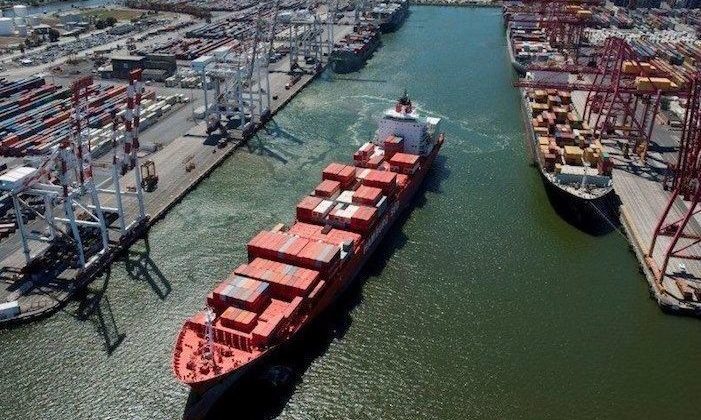Boston Consulting report tells carriers to digitise or die

The container shipping industry must join the digital revolution or face being sidelined, a new report from Boston Consulting Group posits .
“Digital opens the door for carriers to strengthen their direct relationships with end customers, further reduce their costs (including for fuel, vessel operation, and customer service), and pursue new revenue streams beyond traditional shipping services,” the report stated in its introduction.
Only a few leading carriers have applied digital technologies toward enhancing their commercial and operational activities, Boston Consulting reported. Box tracking, empty-container repositioning, document management, network design, and pricing are among the activities that these carriers have started to digitalize.
The consultants suggested that to succeed, carriers must adopt a structured approach to defining a digital vision and integrating new technologies, capabilities, and mindsets into their traditional way of working.
“It is not too late to get started. The industry is still in the early stages of digitalization, and most carriers have yet to achieve significant progress. Carriers that approach a digital transformation with the right ambition, resources, and scale can leap to the forefront of adoption. Within 18 months, they can achieve a step change in their digital capabilities that strengthens their competitive advantage. Quick wins are achievable within 12 months,” the report stated.
Carriers face an increasing threat from what Boston Consulting described as “digital attackers”.
A variety of players—including both traditional logistics players and new entrants—are adopting digital technology to provide seamless, end-to-end services. If these companies’ business models succeed, Boston Consulting suggested carriers run the risk of losing direct contact with some of their most profitable customers—primarily small and midsize freight forwarders and beneficial cargo owners (BCOs).
“In this scenario,” Boston Consulting warned, “the carrier’s role could be reduced to providing commoditized ocean freight services.”
One of the strongest threats, the consultancy said, is from players that are adopting digital technology as the basis for an assetless business model that lets them compete with a much lower cost base.
Recognising the opportunity, e-commerce giant Amazon has obtained a license to operate as an assetless cargo forwarder between China and the US. Startups are also gaining traction. Flexport was cited as an example in the report. The technology-based freight forwarder has, as of October 2017, attracted more than $200m in venture capital investment.
“Flexport is not alone in attracting venture capital,” Boston Consulting relayed. “In the past six years, more than $3.3bn has been invested in digital startups in the shipping and logistics sector.”
To date, Boston Consulting said most carriers have failed to take a systematic approach to digital adoption. Manual intervention is still required for operations such as trimming during voyage, restowage, and documentation management. Network optimisation, empty container repositioning, cargo routing, forecasting, and pricing are among the core processes that can be digitalised. However, most carriers still handle them in the traditional way, without systematically leveraging the power of advanced analytics and artificial intelligence (AI). For example, some carriers that have collected impressive volumes of data lack the skills or agile processes to generate insight and improvements.
Embarking on the digital journey does not require an immediate large-scale and expensive overhaul of IT systems, the report maintained. Carriers should begin by leveraging their existing infrastructure, gradually enhancing systems as required, the consultants advised.
Maersk Line, CMA CGM, and Hapag-Lloyd are among the first carriers to have clarified—and started to pursue—their digital vision, according to Boston Consulting.
“To emerge as a winner in the digital era,” the report concluded, “a carrier must be willing to invest significant time and resources. Most carriers lack an overall vision and compelling plan for digital adoption. They also face major organizational hurdles and are slowed down by the scarcity of workers with digital capabilities and skills. Fortunately, a carrier can overcome such obstacles rapidly by taking a structured and disciplined approach to digital adoption. Although there is still time to get started, we expect the window of opportunity to close soon. Now is the moment for carriers to embark on the voyage to digital leadership.”
